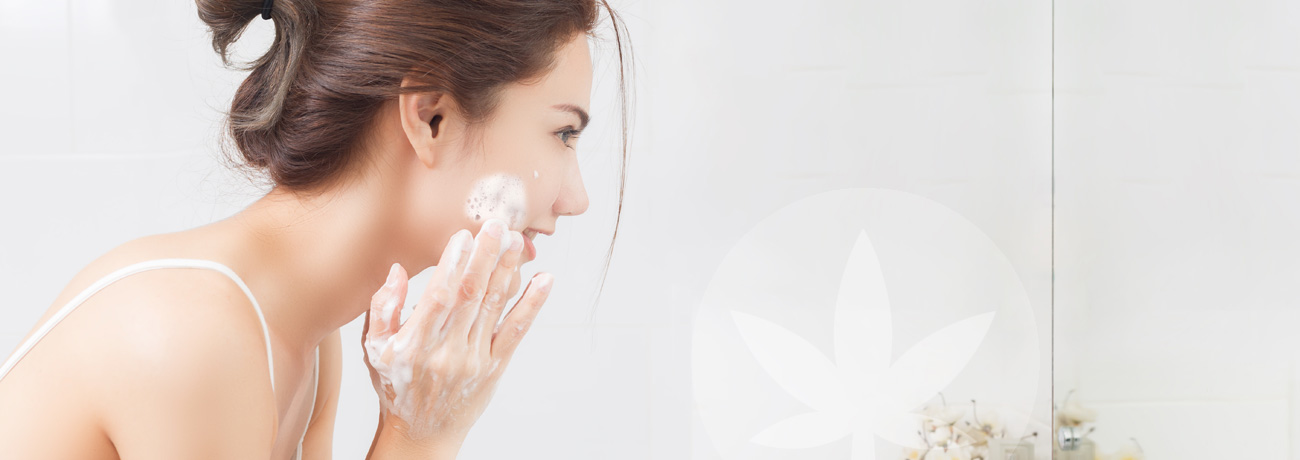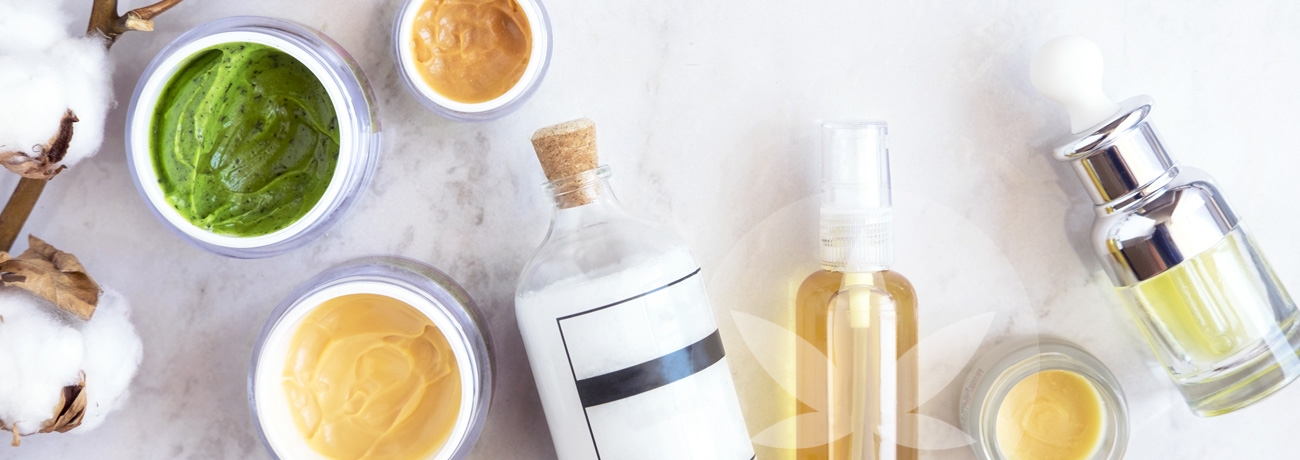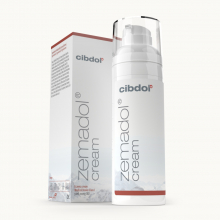How to include CBD into your skincare routine?

Our skin works hard for us. As the largest organ of our body, skin is a living, breathing organism that does an excellent job of protecting us against foreign bodies and infections. So it only makes sense that we take care of it the best we can. Much like we adapt our diets and eat the right foods to keep our digestive systems happy, there's also plenty we can do to make sure our skin looks and feels revitalised. From lotions, creams and moisturisers to toners and cleansers, the list is almost endless.
Contents:
Beauty companies have started working CBD into all kinds of different cosmetics, from body lotions and shampoos to face creams and even bath bombs. But how can you include CBD into your everyday skincare routine? With CBD fast becoming a prominent ingredient in the beauty industry, there's simply been no better time to introduce this cannabinoid into your skincare routine. But how do you go about it?
CBD skin care
As most are aware, CBD can have many effects on us. One popular use is the possible soothing and tension relieving effects it offers, with most users taking a capsule or a few droplets of oil as part of their daily routine. However, how does this cannabinoid factor into a skincare regime, and what are the perks? It's certainly no happy accident that beauty companies have increasingly featured CBD as an ingredient in topical creams and lotions.
When ingesting CBD, the cannabinoid interacts with our body's endocannabinoid system (ECS), changing the binding affinity of various receptors and encouraging the production of beneficial enzymes. CBD's role is to support the ECS in maintaining balance. Fortunately, the same process applies to our skin. But rather than entering the bloodstream, CBD shows potential effectiveness at a more cellular level, providing a localised effect.
While the research behind CBD's impact to improve skincare is still in its infancy, preliminary studies have been promising, demonstrating potential links between the two areas. A study conducted in 2007 by the School of Biomedical Sciences at Nottingham University wanted to understand the role CB2 receptors played in the proliferation of keratinocytes[1]. Keratinocytes account for over 90% of the cells in the outer layer of our skin and are responsible for keeping fungi, viruses and radiation at bay. The problem, however, is that an overactive production of keratinocytes can lead to uncomfortable skin conditions such as psoriasis.
Results showed that while CB receptors didn't play a significant role in the proliferation of keratinocytes, cannabinoids did.
For more information on how CBD interacts with skin, you can check out our dedicated article “How Does CBD Affect The Skin?”.
Why is CBD so popular when it comes to skincare?
It's no happy accident that CBD has risen to prominence. Sure there have been numerous other ingredients used in the field of skincare that have been touted for their abilities and their almost “miracle cure” reputation. However, with CBD, the approach and implementation have been one that has taken some time. For the longest time, cannabis plants and their compounds have been associated with one thing—getting high. However, this is a plant that has so much more to offer. As research has shown, the potential links between CBD and its soothing and antioxidant properties make it ideal and well suited to an area such as skincare. The ongoing research into CBD topical creams and skin conditions make for an exciting prospect.
But it's not just the average consumer that has taken to harnessing CBD for its possible benefits. There are plenty of high-profile users and celebrities that have gotten in on the act of using CBD as part of their skincare regimen. Advocates such as Whoopi Goldberg, Olivia Wilde, Jennifer Aniston and Kristen Bell are all outspoken about the potential effects that CBD has had on their skin. These testimonials alone have been enough to boost the popularity and raise awareness for the use of CBD. For many consumers to hear that their favourite celebrity is endorsing a product is certainly enough for them to investigate it themselves. Couple that with promising, ongoing scientific research and studies, and there's little wonder as to why CBD has become so popular.
What can CBD bring to the skincare industry?
Of course, celebrity testimonials (no matter how appealing) will only go so far. Consumers will need to see results for themselves before knowing that CBD has been effective for them. While this is a blanket statement, each CBD user will have their own perception and experience when using the cannabinoid. Some will immediately feel the potential impact, whereas others may not notice any discernable difference. However, a 2018 review titled “Cannabinoids in Dermatology” suggests the scope of CBD-infused beauty and healthcare products may extend to dozens of skin conditions[2].
Extensive and ongoing scientific research has lead to CBD and other cannabinoids making their way into body lotions, hand soaps, moisturising creams and a whole host of other beauty products. For beauty companies, it's the investment of potential synergetic effects that has many of them so interested. Most ingredients included in standard skincare products already centre around soothing, enhancing and preserving; the addition of CBD is hoped to not only act independently but work with these other ingredients to become greater than the sum of its parts.

CBD and skincare products
When it comes to choosing the right skincare product for you, it's important to note that the beauty industry overall thrives and relies heavily on marketing. Sure, there is a solid body of research into CBD that shows it can provide some potential beneficial properties for skin health. It's also worth noting that not all CBD products are created equally. Your local grocery store pharmaceutical section may not offer the highest quality CBD content. Whereas here at Cibdol, we always recommend choosing products from reputable CBD over products from a company that has recently decided to jump on the CBD bandwagon.
It's certainly worth doing your homework when it comes to this part—research how the CBD is extracted and treated before putting your money down. You'll want to use products that utilise clean extraction methods (such as CO₂). Products that also are from organically sourced hemp will almost certainly ensure that you're getting the most unadulterated product available. Of course, when it comes to skincare products, if you already have a preference for a certain product, look for a CBD infused cream that has similar ingredients.
Topical creams are straightforward to factor into a daily skincare routine, allowing the user to apply them directly to their body for a more localised effect. This could be seen as the “targeted” way to use CBD, enhancing and supporting directly where applied.
However, those looking for other methods of using CBD can opt for ingesting oils and capsules that will allow the cannabinoid to be absorbed into the body through the bloodstream. This is a method that is often favoured by those taking supplements or multivitamins as part of a daily routine and can almost be viewed as a more long term way of taking CBD to enhance the skin and the systems that support it, as it reaches further and wider within the body on a more consistent basis. However, this may not be as effective if you want to target a specific area or utilise other ingredients often included in skin creams.
If you are serious about CBD, balancing both methods can make for an excellent regime that not only helps look after skin but goes beyond it.
CBD topicals
The topicals category is vast and includes creams, salves, lotions, oils and balms. When CBD is applied locally, it is absorbed by the skin, allowing it to interact with the ECS where it is locally applied. By acting in this way, CBD topicals have the potential to revitalise and reduce dryness or sensitivity. Research has also shown the possible link between CBD creams and how they may support those with skin conditions such as eczema, psoriasis and acne[3].
Why should you choose liposomal CBD creams?
Used widely throughout the pharmaceutical industry and increasingly in supplemental formulations, liposomes change the way ingredients are transported within the body. In non-liposomal formulas, active ingredients struggle to penetrate deep into the skin, often failing to reach the cells or blood vessels in their full form. However, liposomal supplements keep the ingredients preserved, intact and able to move through the skin with greater ease, until they are ready to be used. The result is a cream that delivers the active ingredients deeper into the skin, allows for slower metabolisation and thanks to their all-natural method of transportation, fewer applications are needed to get the best out of liposomal creams. Cibdol products that have the presence of liposomes include Zemadol and Soridol. Both creams geared towards the potential relief of those with skin conditions. Of course, for those without skin conditions, liposomal cream can be overkill, as general care and enhancement don't necessarily require it.
How to choose the best CBD products to include in your skincare routine
There are several areas to factor into this decision, many of which will reflect lifestyle as well as personal circumstances. Those looking for assistance with skin conditions may wish to seek a CBD cream that will potentially aid them in that area by providing relief. However, those seeking a skincare product for general daily use may opt for a CBD infused topical hand cream that will allow them access to the possible benefits.
The choice is really down to the user. For a more prospective long-term solution, customers may want to look into oils and capsules in addition to topical and liposomal creams. Here at Cibdol, we strive to cater to all needs and requirements of customers. Out expertly extracted CBD has been implemented into a wide range of creams and other products. All providing the highest quality CBD available with no additional unwanted chemicals or ingredients. Check out our full range to find a product that will undoubtedly suit your needs.
[1] Wilkinson, J. D., & Williamson, E. M. (2007). Cannabinoids inhibit human keratinocyte proliferation through a non-CB1/CB2 mechanism and have a potential therapeutic value in the treatment of psoriasis. PubMed. https://pubmed.ncbi.nlm.nih.gov/17157480/ [Source]
[2] Eagleston, L. R. M., Kalani, N. K., & Patel, R. R. (2018). Cannabinoids in dermatology: a scoping review. PubMed. https://pubmed.ncbi.nlm.nih.gov/30142706/ [Source]
[3] Baswan, S. M., Klosner, A. E., & Glynn, K. (2020). Therapeutic Potential of Cannabidiol (CBD) for Skin Health and Disorders. NCBI. https://www.ncbi.nlm.nih.gov/pmc/articles/PMC7736837/ [Source]
[1] Wilkinson, J. D., & Williamson, E. M. (2007). Cannabinoids inhibit human keratinocyte proliferation through a non-CB1/CB2 mechanism and have a potential therapeutic value in the treatment of psoriasis. PubMed. https://pubmed.ncbi.nlm.nih.gov/17157480/ [Source]
[2] Eagleston, L. R. M., Kalani, N. K., & Patel, R. R. (2018). Cannabinoids in dermatology: a scoping review. PubMed. https://pubmed.ncbi.nlm.nih.gov/30142706/ [Source]
[3] Baswan, S. M., Klosner, A. E., & Glynn, K. (2020). Therapeutic Potential of Cannabidiol (CBD) for Skin Health and Disorders. NCBI. https://www.ncbi.nlm.nih.gov/pmc/articles/PMC7736837/ [Source]













